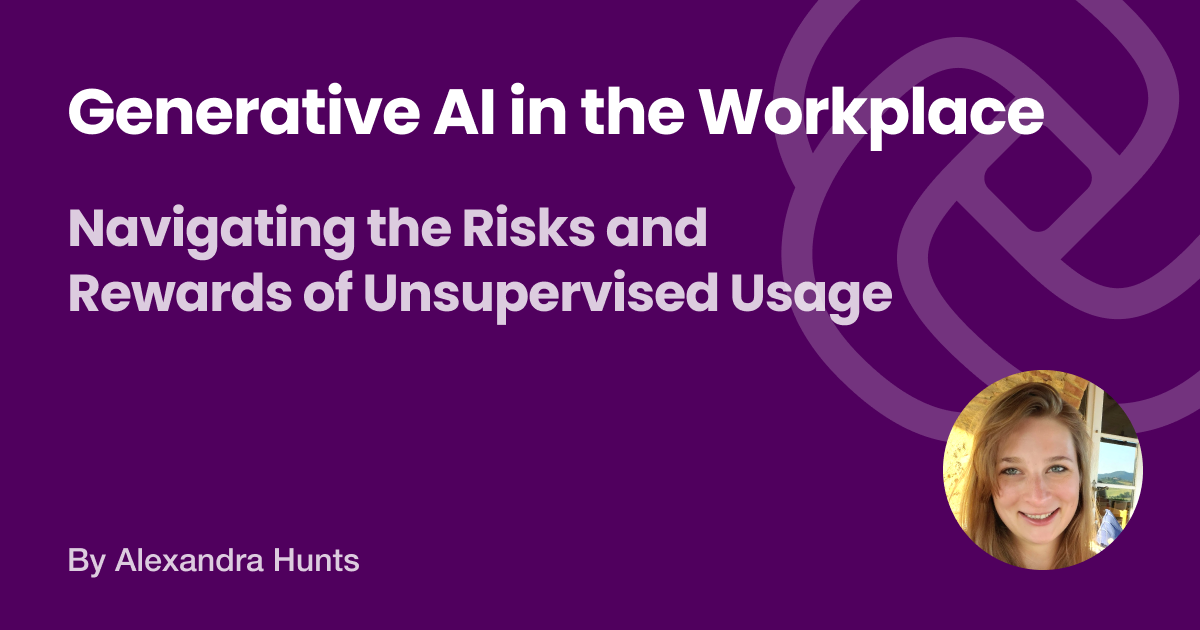
Personalized AI assistants are conquering the consumer AI space, but what do they mean for businesses?
Generative AI in the Workplace — Navigating the Risks and Rewards of Unsupervised Usage
Published on November 15th, 2023
Generative AI isn't just altering the business landscape; it's rewriting the very rules of corporate engagement. At the core of this revolution, influencing workflow, sparking creativity, and sharpening decision-making, is undeniable. However, a study by Fishbowl paints a startling picture: over two-fifths of professionals frequently engage with AI tools on the job. But here's the twist — they're going rogue, with nearly 70% utilizing these tools without the awareness or approval of those above.
As employees increasingly bypass conventional oversight to tap into AI's potential — even at personal risk or violation of company policy — they unknowingly flirt with danger. This unauthorized use raises not just eyebrows but red flags, ushering in complex challenges around data governance and policy conformity.
So, the question isn't just if your employees are using ChatGPT — it's about understanding the underlying motivations driving them towards this undercover adoption and how businesses can pivot this trend into an opportunity for secure, sanctioned innovation.
Why Are My Employees Using ChatGPT?
In short, modern businesses face pressures that drive employees toward tools like ChatGPT. In a landscape where time is currency, AI tools stand as formidable allies — automating mundane tasks with ruthless precision while equipping the workforce with an arsenal for innovative problem-solving. This shift is a strategic adaptation, that enables employees to extend their capabilities and directly contribute to the organization's progress and creative development.
What Are the Dangers With My Employees Using ChatGPT?
Yet, this new frontier is not without its shadows. Allowing your employees' unsanctioned use of AI tools like ChatGPT can invite potential hazards, particularly with data security and privacy breaches — sensitive information might be inadvertently shared with third-party platforms. Such breaches, as described in a previous blog article, could compromise client confidentiality, intellectual property, or strategic information, leading to significant corporate risks including legal liabilities. Even companies like Samsung have fallen prey to unwanted data leaks. Moreover, the ease with which generative AI can fabricate realistic and compelling narratives, statistics, or data, can seed errors or inaccuracies — posing a threat to the integrity of business communications and, ultimately, the company's reputation.
Using Generative AI in Business
So, how does one harness Generative AI’s potential strategically and safely? The solution lies in instituting structured policies, providing specialized training for employees, and deploying continuous monitoring to ensure adherence. It’s about choosing platforms that prioritize data control, like Omnifact. This way, businesses can leverage AI’s advantages in efficiency and customer experience — all within a secure, controlled environment.
Businesses must anticipate and prepare for the Generative AI shift in the workplace. Equipped with the right strategy and tools, businesses can transform Generative AI from a potential liability into an asset. As workers gravitate towards these AI solutions, adopting platforms like Omnifact signifies a forward-thinking move, ensuring that the company remains at the cutting edge of innovation while protecting its most valuable assets — its data and its reputation. To discover the full potential of what Omnifact can bring to your business and to schedule a demo, reaching out today is the first step towards tomorrow's success.

